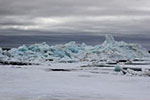Arctic rivers, an important mercury vector to the Arctic Ocean
The February 21, 2019

In a new study, researchers from Toulouse INP, CNRS and Paul Sabatier University in collaboration with international scientists suggest that Arctic rivers transport large amounts of mercury to the Arctic Ocean.
Mercury levels in Arctic marine wildlife are among the highest in the world and affect indigenous populations who depend on seafood. The origin of the mercury has long been thought to originate from industrial activities in developed countries. Yet how the mercury reaches the Arctic has been difficult to understand.
Jeroen Sonke from GET (laboratoire Geoscience Environnement Toulouse) joined his colleagues Oleg Pokrovsky from GET and Roman Teisserenc from (laboratoire d’Écologie Fonctionnelle Environnement) (EcoLab) to put together the missing elements.
From 2012 to 2016 they observed mercury concentrations for two large Eurasian rivers, the Yenisei and the Severnaya Dvina and present a comprehensive seasonal arctic river mercury flux.
Their findings, published in the PNAS journal, confirm rivers carried large quantities of mercury to the Arctic Ocean. The scientists explain how anthropogenic mercury emissions reach the terrestrial Arctic by air, where vegetation uptake transfers atmospheric gaseous mercury to tundra and boreal peat soils. Springtime snow melt mobilizes the tundra soil mercury to rivers and the Arctic Ocean.
Current Arctic warming and springtime snowmelt is likely to mobilize large quantities of mercury from tundra soil to the Arctic Ocean via rivers, potentially increasing the risk to human health.
Source
Jeroen E. Sonke, Roman Teisserenc, Lars-Eric Heimbürger, Mariia V. Petrova, Nicolas Marusczak, Theo Le Dantec, Artem V. Chupakov, Chuxian Li, Colin P. Thackray, Elsie M. Sunderland, Nikita Tananaev, Oleg S. Pokrovski (2018) Eurasian river spring flood observations support net Arctic Ocean mercury export to the atmosphere and Atlantic Ocean, PNAS, doi/10.1073/pnas.1811957115
Contacts
Jeroen Sonke, GET, jeroen.sonke @ get.omp.eu, 05 61 33 26 06
Roman Teisserenc, Ecolab, roman.teisserenc @ ensat.fr, 06 71 49 11 07



